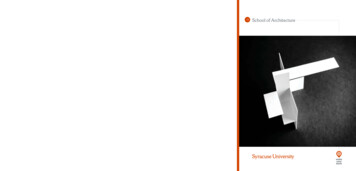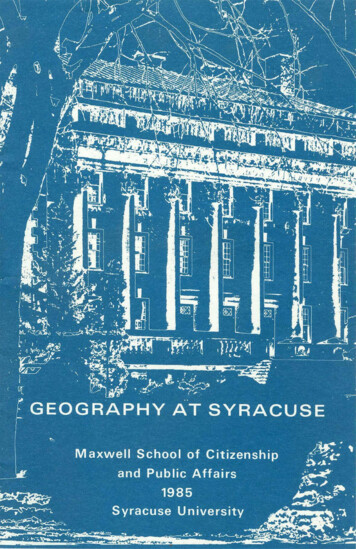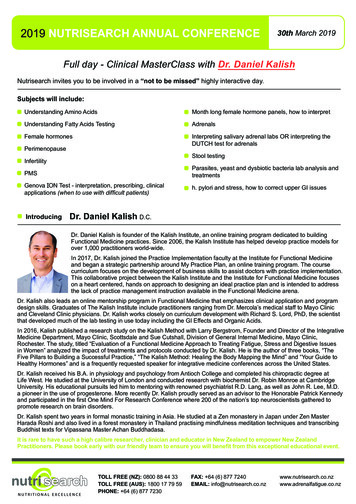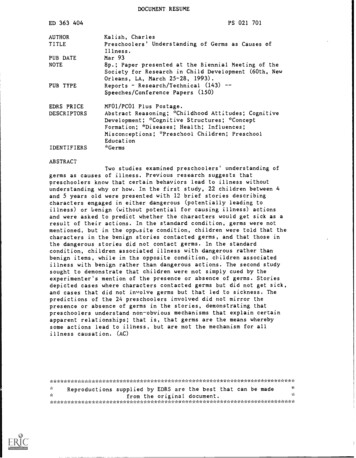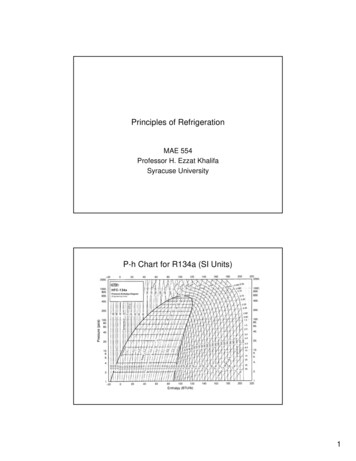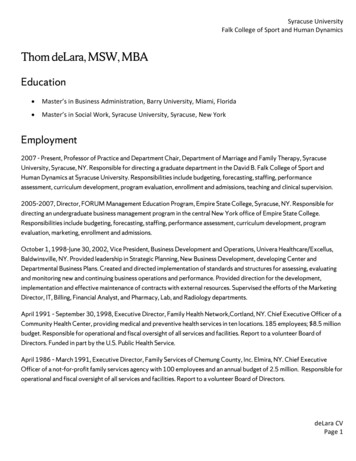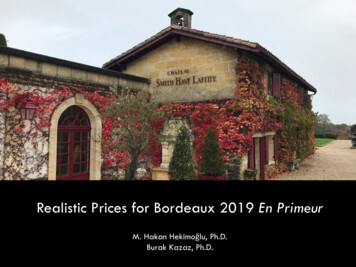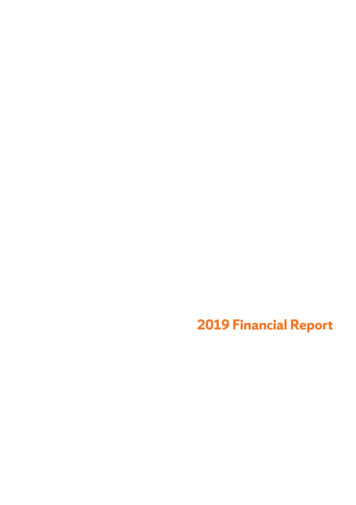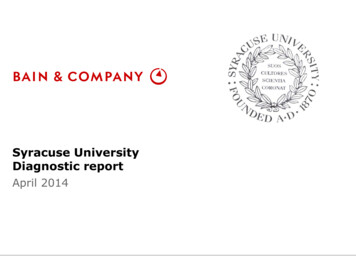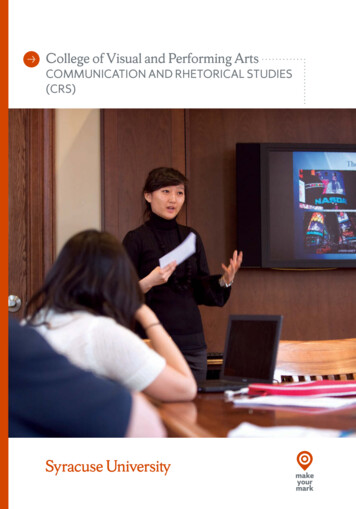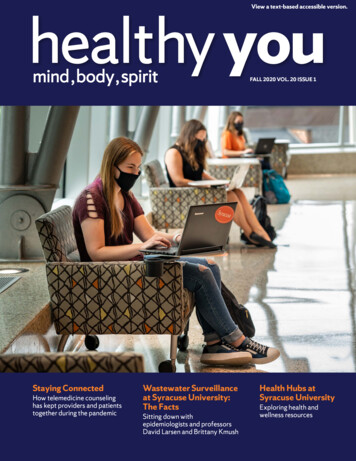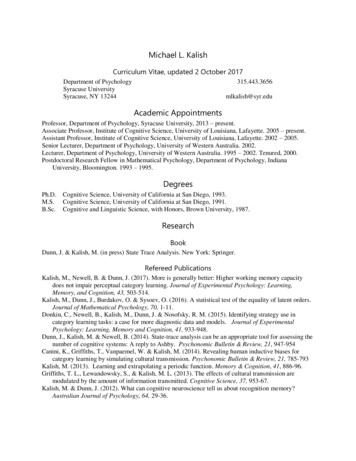
Transcription
Michael L. KalishCurriculum Vitae, updated 2 October 2017Department of PsychologySyracuse UniversitySyracuse, NY 13244315.443.3656mlkalish@syr.eduAcademic AppointmentsProfessor, Department of Psychology, Syracuse University, 2013 – present.Associate Professor, Institute of Cognitive Science, University of Louisiana, Lafayette. 2005 – present.Assistant Professor, Institute of Cognitive Science, University of Louisiana, Lafayette. 2002 – 2005.Senior Lecturer, Department of Psychology, University of Western Australia. 2002.Lecturer, Department of Psychology, University of Western Australia. 1995 – 2002. Tenured, 2000.Postdoctoral Research Fellow in Mathematical Psychology, Department of Psychology, IndianaUniversity, Bloomington. 1993 – 1995.DegreesPh.D.M.S.B.Sc.Cognitive Science, University of California at San Diego, 1993.Cognitive Science, University of California at San Diego, 1991.Cognitive and Linguistic Science, with Honors, Brown University, 1987.ResearchBookDunn, J. & Kalish, M. (in press) State Trace Analysis. New York: Springer.Refereed PublicationsKalish, M., Newell, B. & Dunn, J. (2017). More is generally better: Higher working memory capacitydoes not impair perceptual category learning. Journal of Experimental Psychology: Learning,Memory, and Cognition, 43, 503-514.Kalish, M., Dunn, J., Burdakov, O. & Sysoev, O. (2016). A statistical test of the equality of latent orders.Journal of Mathematical Psychology, 70, 1-11.Donkin, C., Newell, B., Kalish, M., Dunn, J. & Nosofsky, R. M. (2015). Identifying strategy use incategory learning tasks: a case for more diagnostic data and models. Journal of ExperimentalPsychology: Learning, Memory and Cognition, 41, 933-948.Dunn, J., Kalish, M. & Newell, B. (2014). State-trace analysis can be an appropriate tool for assessing thenumber of cognitive systems: A reply to Ashby. Psychonomic Bulletin & Review, 21, 947-954Canini, K., Griffiths, T., Vanpaemel, W. & Kalish, M. (2014). Revealing human inductive biases forcategory learning by simulating cultural transmission. Psychonomic Bulletin & Review, 21, 785-793Kalish, M. (2013). Learning and extrapolating a periodic function. Memory & Cognition, 41, 886-96.Griffiths, T. L., Lewandowsky, S., & Kalish, M. L. (2013). The effects of cultural transmission aremodulated by the amount of information transmitted. Cognitive Science, 37, 953-67.Kalish, M. & Dunn, J. (2012). What can cognitive neuroscience tell us about recognition memory?Australian Journal of Psychology, 64, 29-36.
KalishCurriculum VitaeDunn, J., Newell, B. & Kalish, M. (2012). The effect of feedback delay and feedback type on perceptualcategory learning. Journal of Experimental Psychology: Learning, Memory and Cognition, 38, 840859.Lewandowsky, S., Yang, L., Newell, B. & Kalish, M. (2012). Working memory does not dissociatebetween different perceptual categorization tasks. Journal of Experimental Psychology: Learning,Memory and Cognition, 38, 881-904.Kwantes, P., Neal, A. & Kalish, M. (2012). Item order matters in a function learning task. CanadianJournal of Experimental Psychology, 66, 90-97.Trigg, J. & Kalish, M. (2011). Explaining how the mind works: on the relation between cognitive scienceand philosophy. Topics in Cognitive Science, 3, 399-424.Newell, B., Dunn, J., & Kalish, M. (2011). Systems of category learning: fact or fantasy. In B. Ross (Ed.)The Psychology of Learning and Motivation, Vol 54 (pp. 167-215), Burlington: Academic Press.Newell, B., Dunn, J., & Kalish, M. (2010). The dimensionality of perceptual category learning: A statetrace analysis. Memory and Cognition, 38, 563-581.Trigg, J. & Kalish, M. (2010). Thought, language and mental representation. In S. Ohlsson & R.Catrambone (Eds.) Proceedings of the 32nd Annual Meeting of the Cognitive Science Society (p188193).Robinette, L., Feist, M., & Kalish, M. (2010). Framed: Factors influencing reference frame choice intabletop space. In S. Ohlsson & R. Catrambone (Eds.) Proceedings of the 32nd Annual Meeting of theCognitive Science Society (p1064-1069).Lewandowsky, S., Griffiths, T. & Kalish, M. (2009). The wisdom of individuals: Exploring people'sknowledge about everyday events using iterated learning. Cognitive Science, 33, 969-998.Griffiths, T., Lucas, C., Williams, J. & Kalish, M. (2009). Modeling human function learning withGaussian processes. Advances in Neural Information Processing Systems, 21.Griffiths, T.L., Christian, B.R., & Kalish, M.L. (2008). Using category structures to test iterated learningas a method for revealing inductive biases. Cognitive Science, 32, 68-107.Griffiths, T., Kalish, M. & Lewandowsky, S. (2008). Theoretical and empirical evidence for the impact ofinductive biases on cultural evolution. Philosophical Transactions of the Royal Society, Series B.363, 3503–3514.Griffiths, T.L., Christian, B.R., & Kalish, M.L. (2008). Using category structures to test iterated learningas a method for revealing inductive biases. Cognitive Science, 32, 68-107.Kalish, M., Griffiths, T. & Lewandowsky, S. (2007). Iterated learning: Intergenerational knowledgetransmission reveals inductive biases. Psychonomic Bulletin and Review, 14, 288-294.Griffiths, T. & Kalish, M. (2007). Language evolution by iterated learning with Bayesian agents.Cognitive Science, 31, 441-480.Griffiths, T., Christian, B. & Kalish, M. (2006). Revealing priors on category structures through iteratedlearning. Proceedings of the 28th Annual Conference of the Cognitive Science Society.Kalish, M., Lewandowsky, S. & Davies, M. (2005). Error-driven knowledge restructuring in categorylearning. Journal of Experimental Psychology: Learning, Memory and Cognition, 31,846-861.Griffiths, T., & Kalish, M. (2005). A Bayesian view of language evolution by iterated learning. In B. G.Bara, L. Barsalou, & M. Bucciarelli (Eds.), Proceedings of the twenty-seventh annual conference ofthe cognitive science society (p. 827-832). Mahwah, NJ: Erlbaum.Kalish, M., Lewandowsky, S., & Kruschke, J. (2004). Population of Linear Experts: KnowledgePartitioning and Function Learning. Psychological Review, 111, 1072-1099.Griffiths, T. L. & Kalish, M. (2002). A multidimensional scaling approach to mental multiplication.Memory and Cognition, 30, 97-106.Lewandowsky, S. L, Kalish, M. & Ngang, S. K. (2002). Simplified learning in complex situations:Knowledge partitioning in function learning. Journal of Experimental Psychology: General, 131,163-193.Kalish, M. (2001). An inverse base rate effect with continuously valued stimuli. Memory and Cognition,29, 587-597.2
KalishCurriculum VitaeKalish, M. & Kruschke, J. (2000). The role of attention shifts in categorization of continuousdimensioned stimuli. Psychological Research, 64, 105-116.Lewandowsky, S. L, Kalish, M. & Griffiths, T. L. (2000). Categorization using context: Expedient errorsand resistance to knowledge restructuring. Journal of Experimental Psychology: Learning, Memoryand Cognition, 26,1666-1684.Kalish, M., Lewandowsky, S. & Dennis, S. (1999). Remote delivery of cognitive science laboratories: Asolution for small disciplines in large countries. Behavior Research Methods, Instruments andComputers, 31, 270-274.Wynne, C.D. & Kalish, M. (1999). Effects of occasional short interfood intervals on temporal control inpigeons. Behavioral Processes, 45, 207-218.Goertzel, B. & Kalish, M. (1998). Similarity as compression. The Noetic Journal, 1, 174-182.Henmi, T., & Kalish, M. (1998). Dynamics of iterated perception. Complexity International, 6.Availableon line at tzel, B. & Kalish, M. (1998). Mindspace curvature: The non-Euclidian geometry of perception andillusion. The NoeticJournal, 1, 207-230.Kalish, M. & Kruschke, J. (1997). Decision boundaries in one dimensional categorization. Journal ofExperimental Psychology: Learning, Memory and Cognition. 23, 1362-1377.Kalish, M. (1994). Idiosyncratic errors in visually directed reaching. Journal of Motor Behavior, 26, 296300.Kalish, M. (1994). Adaptive learning of Gaussian categories leads to decision bounds and responsesurfaces incompatible with optimal decision making. Proceedings of 16th Annual Conference of theCognitive Science Society, 479-484.Kalish, M. (1993). Affordance learning as a problem of information integration. In S. Valenti & J.Pittenger (Eds.) Studies in Perception and Action II, (pp. 130-134). Hillsdale, NJ: LEA.Kalish, M. (1991). Human performance in visually directed reaching results in systematic, idiosyncraticerror. Proceedings of 13th Annual Conference of the Cognitive Science Society, 770-774.Warren, W., Blackwell, A., Kurtz, K., Hatsopoulos, N. & Kalish, M. (1991). On the sufficiency of thevelocity field for perception of heading. Biological Cybernetics, 65, 770-774.Warren, W., Morris, M. & Kalish, M. (1988). Perception of translational heading from optical flow.Journal of Experimental Psychology: Human Perception and Performance, 14, 646-660.Grants and FellowshipsNational Science Foundation, 2013-2016. Principle Investigators: M. Kalish & M. Lee. Direct Costs: 521,947. Title: Classifying Categorization Using State Trace Analysis and Hierarchical BayesianModeling.Australian Research Council (ARC) Discovery Grant, 2013-2015. Principle Investigators: J Dunn, MKalish, O. Burdakov, L. Anderson. 293,000. Title: State-trace analysis: theory and application.Louisiana Board of Regents Traditional Enhancement Grant, 2009-2010. Principle Investigator: M.Kalish. Project Team: S. Feist & C. Rice. 85,672. Title: Computational resources for cognitivescience.ARC Discovery Grant, 2007-2010. Principle Investigators: B. Newell, J. Dunn, M. Kalish. 100,000.Title: Dual process models of categorizationNational Science Foundation, 2006-2009. Principle Investigators: M. Kalish & T. Griffiths. DirectCosts: 375,000. Title: Iterated learning with Bayesian agents.Louisiana Board of Regents Research Competitiveness Grant, 2004-2006. Principle Investigator: M.Kalish. Direct costs: 98,910. Title: Knowledge restructuring during concept learning.ARC Discovery Grant, 2002-2005. Chief Investigators: S. Lewandowsky & M. Kalish. 150,000. Title: Models of knowledge restructuring.UWA Research Grant, 2001. Chief Investigators: S. Lewandowsky & M. Kalish. 12,489. Title:Facilitation of knowledge restructuring: training better experts, faster.3
KalishCurriculum VitaeARC International Research Exchange Grant, 2000. Chief Investigators: M. Kalish, S.Lewandowsky. Partner Investigator: J. Kruschke. Associate Investigator: R. Kliegl. 14,400. Title:Knowledge partitioning: models of the limits of expertise.Australian Partnership for Advanced Computing, Merit Allocation Scheme, 2000. Chief Investigators: M.Kalish & G. Zemunik. Title: A neural model of insect olfaction.ARC Large Grant, 1999–2001. Chief Investigators: M. Kalish, S. Lewandowsky. Partner Investigator: J.Kruschke. Associate Investigator: R. Kliegl. 124,000. Title: Knowledge partitioning: models of thelimits of expertise.ARC Small Grant, 1999. Chief Investigator: M. Kalish. 19,000. Title: Initial testing of an inclusivemodel of concept acquisition.ARC Small Grant, 1997. Chief Investigator: M. Kalish. 10,915. Title: Reaching without visual feedback.Commonwealth Department of Health and Family Services, Office of Disabilities Grant, June 1996–Dec1997. 62,164. Project Team: K. Hird, N. Hennessey, M. Kalish. Title: Speech access to computertechnology for people with physical disabilities.Department of Psychology, UWA Research Initiative Grant, 1996. 6,000. Investigator: M. Kalish. Title:Infrastructure for Motor Control Research.NIH Training Program Postdoctoral Fellowship, Indiana University, 1993–1995National Defense Science and Engineering Fellowship, UC San Diego, 1989–1992Brown University Undergraduate Research Fellowship, 1987Other PublicationsSmith, K., Kalish, M., Griffiths, T. & Lewandowsky, S. (2008). Introduction. Cultural transmission andthe evolution of human behaviour. Philosophical Transactions of the Royal Society B, 363, 3469–3476.Lewandowsky, S., Little D. R., & Kalish, M. (2007). Knowledge and expertise. In F. T. Durso, R.Nickerson, S. Dumais, S. Lewandowsky & T. Perfect (Eds.). Handbook of applied cognition (2ndEd.) (83-110). Chichester: Wiley.Kalish, M. & Barousse, C. (2006). Review of Michael R.W. Dawson, Connectionism: A Hands-OnApproach. Trends in Cognitive Science, 10, 6-8.Doyle, M. & Kalish, M. (2004). Stigmergy: Indirect communication in multiple mobile autonomousagents. In M. Pechoucek & A. Tate (Eds.) Knowledge Systems for Coalition Operation (151-158).Prague: Czech Technical University.Kalish, M., Lewandowsky, S. and Dennis, S. (1999). The remote delivery of cognitive science. In K.Martin, N. Stanley & N. Davison (Eds.), Teaching in the Disciplines / Learning in Context:Proceedings of the 8th Annual Teaching Learning Forum (178-183). Perth: UWA.Rhodes, G. & Kalish, M. (1999). Cognitive penetration: Would we know it if we saw it? Brain andBehavioral Sciences, 22, 390-391.Roberts, B., Kalish, M., Hird, K., & Kirsner, K. (1999). Decontextualized data in, decontextualized theoryout. Brain and Behavioral Sciences, 22, 54-55.Hird, K., Hennessey, N. W., & Kalish, M. (1997). Speech access to computer technology for people withphysical disabilities. National Disability Research Agenda Report No.1.Kalish, M. & Nygaard, L. (1994). Modeling the effect of learning voices on the perception of speech.Research on Spoken Language Processing, Progress Report No. 19, Speech Research Laboratory,Indiana University.Kalish, M. (1992). Limitations on what reaching can tell us about sensorimotor transformations. Brainand Behavioral Sciences, 15, 344.Kalish, M. & Harris, C. (1991). An empirical study of the ability of back propagation to approximateposterior probabilities. Proceedings of the Fifth International Joint Conference on Neural Networks,(2454-2457).4
KalishCurriculum VitaeTeachingPublication:Kalish, M., Lewandowsky, S. & Dennis, S. (1999). (Item appears in main Publication list.)Grants:Syracuse University Science Equipment Excellence Fund Grant 2015-16. M. Kalish. Title: UnderstandingCognitive Science through Mobile Robots. 16359.40Louisiana Board of Regents Traditional Enhancement Grant, 2009-2010. Principle Investigator: M.Kalish. Project Team: S. Feist & C. Rice. 85,672. Title: Computational resources for cognitivescience. (Item appears in main Grants list)University of Louisiana, Lafayette. Instructional MiniGrant, 2005. M. Kalish. 800. Title: Mobilerobots for cognitive science.University of WA Faculty of Science Teaching Initiative Grant, 2000. M. Kalish. 2,500. Title: A quietspace: using Lego robots to teach cognitive science.University of WA Teaching and Learning Committee Grant, 1998. Project Team: M. Kalish and S.Lewandowsky. 9,578. Title: Flexible delivery of cognitive science tutorials.University of WA Initiatives Fund, 1996. Project Team: S. Lewandowsky, M. Kalish & others. 249,000.Title: Interdisciplinary complex cognitive processes laboratory.Professional ServiceNational/International Administrative Service:Guest Editor, Philosophical Transactions of the Royal Society (B), 2008. With three others, directedreviews and revisions of papers from a series of invited colloquia sponsored by the British ResearchCouncil.Co-chair, Australasian Cognitive Science Organizing Committee. 2001 – 2002. Planning for a conferencewith registration of 100. Established organizing committee; chair of accommodations committee;liaison with local government organizations regarding community support and involvement inconference.Symposium Co-Chair, International Conference on Memory, 2001. With one other, organized speakersfrom the US, Australia, Europe and Middle East to present research on function learning at thisconference in Valencia, Spain.Guest Editor, Australian Journal of Psychology, Vol 50, No. 3 (1997/8). With two others, directedreviews and revisions of papers from national and international authors for a special issue devoted tomathematical psychology.Co-Chair, Eighth Australasian Mathematical Psychology Conference, University of WA, Perth,November 28–30, 1997. Registered attendance of 50. Directed collection of submitted abstracts andarranged papers into program. Composed call for papers, registration brochure, and program.Solicited departmental and university funds to host international invited speakers.Member, Organizing Committee for Australian Experimental Psychology Conference, University of WA,Perth, March 22–24, 1996. Arranged papers into multiple-track program, directed selection ofprizewinners for excellent student papers.Service, Syracuse UniversityUniversity Service:Member, Research Computing Advisory Council. 2014-present5
KalishCurriculum VitaeMember, Arts & Sciences Academic Strategic Planning Working Group (Research and Discovery) 2017Member, Arts & Sciences Curriculum Committee. 2014-16Chair, PhD Oral Defense (Philosophy x 2, iSchool)Examiner, PhD Oral Defense (Falk)Department Service:Examiner, PhD Oral Defense (two candidates)Chair, Psychology workload policy working group 2016-7Member, Psychology Executive Committee 2014-presentChair, Psychology T&P subcommittee (1 candidate) 2015Chair, Psychology Undergraduate Curriculum Revision Committee 2014-5Member, Psychology Annual Performance Review Committee (multiple)Member, Psychology Social Area Faculty Search Committee 2014Psychology Research Mentor (two mentees) 2013-presentCBB Area Graduate Student Evaluation Coordinator 2013-presentOther Professional Activities:Member, NSF Review Panel (2015)Member, NSF Graduate Fellowship Review Panel (2016)Journal manuscripts reviewed for Journal of Experimental Psychology (various) Journal of Mathematical Psychology Psychological Review PNAS Cognitive Science Cognition etc.Affiliations: Psychonomic SocietyCognitive Science SocietySociety for Mathematical Psychology6
Michael L. Kalish Curriculum Vitae, updated 2 October 2017 Department of Psychology 315.443.365
